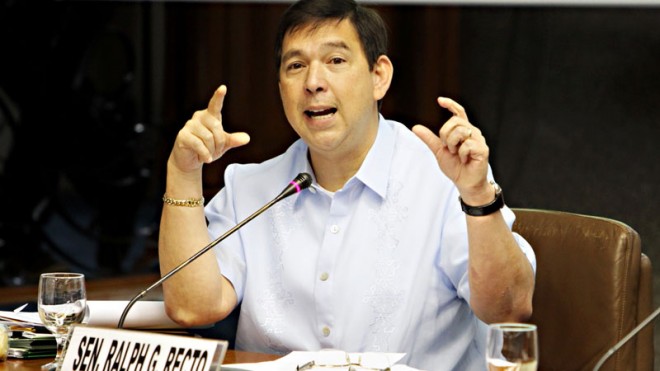In lieu of the proposed Salary Standardization Law (SSL) IV, President Benigno Aquino III can issue an executive order so that government workers can still get their pay hike even without the measure, Senate President Pro Tempore Ralph Recto said on Wednesday.
Recto said a presidential order can be the “Plan B” to effect the new wage rates under the pay hike bill, which has been stalled in the congressional bicameral conference committee over the issue of including military pensioners in the increase.
“I think that at this stage, the President’s men should start drafting the executive order,” he said in a statement.
Congress, he said, has already appropriated the amount of P57.9 billion, representing the cost of the first annual installment of SSL IV, in the 2016 General Appropriations Act, “so the spending authority is already there.”
READ: Senate OKs proposed pay hike for gov’t workers
“By issuing an executive order, the President will be merely implementing a program which, in principle, Congress has consented to,” said Recto.
He pointed out the “many standing precedents in which presidential power was used to effect compensation adjustment in the government.”
During the time of former President and now Pampanga Representative Gloria Macapagal-Arroyo, Recto said, this prerogative was invoked four times — in 2001 and yearly between 2006 and 2008.
In 2001, he said, Arroyo issued Executive Order 22 granting a five-percent increase over monthly salaries of civilian and uniformed personnel. In 2006, she issued Administrative Order No. 144 granting additional compensation of one thousand pesos to government employees.
The following year, Recto said, Arroyo signed Executive Order No. 611 granting a 10-percent increase in basic monthly salaries of civilian government personnel and likewise increasing the subsistence allowance and hazard pay of military and uniformed personnel.
In 2008, Arroyo caused the increase of 10% over the basic monthly salaries of civilian, military and uniformed personnel through Executive Order No. 719.
The senator said former President and now Manila Mayor Joseph Estrada also exercised this prerogative, issuing EO 219 in 2000, which grants “salary adjustment to all government personnel.”
During the time of the late President Corazon Aquino, Recto said, three EOs were issued by her, one in 1986, and two in 1987, all of which hiked government sector pay.
Under RA No. 6758 known as the “Compensation and Position Classification Act of 1989” and PD 1597, the senator said, the Chief Executive was granted the power to revise the compensation and classification system and approve the grant of additional allowances and other fringe benefits to employees of the national government.
READ: Aquino may order pay hike for gov’t workers sans SSL, Drilon says
Because any presidential order would merely implement the pay hike appropriation in the national budget, “then it will only be good and valid for 2016, for the budget year it was appropriated. Kung ang budget cover ay for 2016 lang (If the budget cover is only for 2016), then the EO is for 2016 din lang (also),” the senator explained.
“This means the SSL IV will have to be resubmitted to the next Congress that will convene in July,” he said. “This would provide time to further study the bill, polish it, remove the contentious provisions, probably further increase the salary for teachers, policemen and soldiers, and raise military pension.”
Recto, however, reminded “all the president’s men” involved in the pay raise project to include a provision “protecting Magna Carta benefits” in the presidential order.
“There should be a ‘non-diminution of benefits’ clause in the Malacañang order that will be issued. Specifically, this provision must be included: ‘Nothing in this Act shall be interpreted to reduce, diminish or alter benefits provided for in existing laws on Magna Carta benefits.’”
“This is the clause government teachers, scientists, nurses, doctors and social workers want because it removes all ambiguities in the measure that can be interpreted as a pay cut. That’s a short 22-word provision that can bring comfort to Magna Carta beneficiaries,” he further said. CDG


